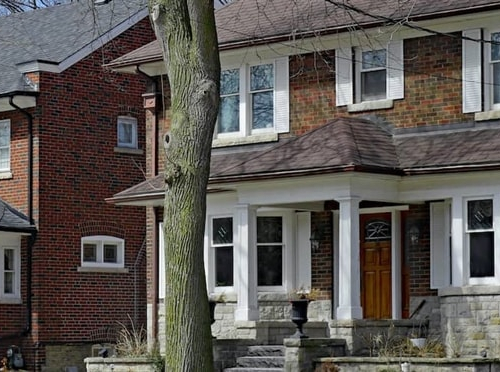Your ultimate guide to home loans for people with disabilities
Contributed by Tom McLean
Jan 23, 2026
•13-minute read

The law in the United States protects people with disabilities from discrimination when buying a home, including home loans for people on disability. If you're living with a disability, there are programs that can help you buy a home that's safe, accessible, and suited to your needs.
This guide covers housing loans for people with disabilities. Additionally, it provides information on grants and nonprofits that can assist with down payments and home modifications. You'll also learn how lenders count SSDI and SSI income, what the Fair Housing Act protects, and exactly how to file a discrimination complaint if you need to.
How does the government classify disabilities for housing?
More than 70 million adults – over 1 in 4 Americans – report having a disability, according to a 2024 report from the Centers for Disease Control.
People with disabilities that qualify as "mental or physical impairments that substantially limit one or more major life activities” are protected under the Fair Housing Act against discrimination in any aspect of renting or buying a home.
Examples of disabilities protected under the Fair Housing Act include:
- Blindness
- Hearing impairment
- Mobility impairment
- HIV infection
- Intellectual disabilities
- Alcoholism
- Drug addiction
- Chronic fatigue
- Learning disability
- Head injury
- Mental illness
Can you buy a house on SSDI or SSI?
Some folks with disabilities receive Social Security Disability Insurance (SSDI) or Supplemental Security Income (SSI) benefits.
The main difference is that SSDI is tied to your work history. You qualify if you've worked long enough and paid enough Social Security taxes. SSI, on the other hand, isn't linked to your work history, but you'll need to be at least 65 to qualify.
SSDI provides monthly payments to those who qualify. The amount paid varies depending on the individual and how much they've paid into Social Security during their life. If you cannot work for a year or more, you may qualify for SSDI benefits.
SSI provides supplemental income to people with disabilities or older Americans who are limited in resources and income. The benefit amount depends on factors like your income, living situation, and assets.
Separately, if you've been working and suffer a qualifying injury, illness, or medical condition, or have little or no income, you may qualify for short-term disability. This is paid for by employers. Currently, five states mandate short-term disability benefits: California, Hawaii, New Jersey, New York, and Rhode Island.
These government programs typically consider disability benefits as income when determining mortgage eligibility.
Government home loans, grants, and programs for buyers with disabilities
When you live with a disability, you may face economic challenges – like lower income or credit concerns. Additionally, you're more likely to incur medical expenses, which can lead to greater financial hardship. You also may need a home with specific accommodations.
There are loan programs and grants available to help people with disabilities access safe homes and a mortgage that meets their financial needs and budget.
Conventional loans
Conventional loans are provided by private lenders without government backing. Conventional loans that conform to specific federal requirements – primarily a maximum loan amount – can be sold to Fannie Mae and Freddie Mac.
Conventional loans are the most common type of mortgage. Requirements are more stringent than for some government-backed loans, but conventional loans often are cheaper for those who can qualify for them.
Most conventional loans offer similar structures and attributes. Let's take a look:
|
Requirements |
A good credit history. A specific credit score minimum is no longer required. A debt-to-income (DTI) ratio of 50% or lower A down payment of at least 3%, though borrowers must pay private mortgage insurance with a down payment of less than 20%.1 |
|
Second home/investment property guideline |
Down payment expectations for a second home will be higher. |
|
Loan limits (2026) |
$832,750 – $1,249,125 (one unit) |
|
Ideal applicant for a conventional loan |
A lower-income individual (who may seek down payment assistance) |
Both Freddie Mac and Fannie Mae (government-sponsored entities) offer conventional mortgage programs with low down payment requirements:
- Freddie Mac Home Possible®: This program allows a 3% down payment; qualifying income is limited to 80% of the area median income. Some credit fees are capped.2
- Fannie Mae HomeReady®: Designed for low-income or very low-income borrowers, this program also allows a low 3% down payment. It also provides a $2,500 credit for eligible applicants to assist with down payment or closing costs.
FHA loans
Loans backed by the Federal Housing Administration are aimed at buyers with lower credit scores. Lenders, including Rocket Mortgage, offer FHA loans with a down payment of at least 3.5% to borrowers with a credit score of 580 or higher.3 Other lenders may allow a credit score of 500-579 with a down payment of at least 10%.
| Requirements |
|
| Second home or investment property guideline | Second homes or investment properties are not eligible for FHA loans. |
| Loan limits for 2026 | $541,287 – $1,249,125 (for one-unit properties by area) |
| Ideal applicant | Buyers with a low credit score |
USDA loans
Loans backed by the U.S. Department of Agriculture help low- to mid-income borrowers buy homes in specific rural areas. Currently, Rocket Mortgage doesn't offer USDA loans.
To see how a USDA loan program can help you buy a home, you'll want to explore USDA Single Family Housing Direct Home Loans and USDA Single Family Housing Repair Loans & Grants.
USDA Single Family Housing Direct Home Loans
Also known as the Section 502 Direct Loan Program, the USDA Single Family Housing Direct Home Loans helps low-income and very-low-income individuals buy a home that is safe and sanitary in eligible rural communities.
There are numerous eligibility criteria for this loan, including:
- Not having safe, sanitary, and decent housing
- Not able to get a loan elsewhere because of terms and conditions that one could expect can be met (within reason)
- Plan to live in the home as the primary residence
- Is legally eligible to take on a mortgage
- Meet the citizenship or noncitizenship requirements
- Not be suspended (or disbarred) from federal programs
Further, the loan provides details on the types of properties that you can finance as a borrower. Properties must:
- Not have a fair market value exceeding the loan limitations
- Not to be used for income-generating activities
These loans offer the option for a longer payback period (33 years, or up to 38 years for very-low-income buyers). Plus, no down payment is required.
|
Requirements |
|
|
Ideal applicant |
A low-income or very-low-income home buyer who wishes to purchase a home in a rural area |
USDA Single Family Housing Repair Loans & Grants
The USDA Single Family Housing Repairs Loans & Grants program helps homeowners borrow money to repair, update, or improve their homes.
If you're 62 or older and need to remove safety or health hazards from your residence, you may also be eligible for this loan.
| Requirements |
|
|---|---|
| Loan limits |
$40,000 |
| Grant limits |
$10,000, or $15,000 if the damaged home is in a presidentially declared disaster area) |
| Potential maximum | $50,000, or $55,000 if the damaged home is in a presidentially declared disaster area |
| Interest rate | 1% |
| Loan term | 20 years |
| Who it’s good for | Low-income borrowers and borrowers age 62 and older who need to make home modifications |
VA housing grants
If you're a veteran who lives with a disability, you might be able to qualify for home loans and . Here are three core grant programs that offer home buying assistance.
Specially Adapted Housing (SAH) Grant
The SAH grant is available to veterans with a service-related disability. The grant is provided to help disabled veterans buy and move into a new home that better meets their needs.
Disabilities that qualify for this grant include service-connected disabilities, such as severe burns, loss of limbs, loss of use of limbs, and blindness in both eyes.
| Requirements |
|
| Grant limits for 2026 |
$126,526 |
| Ideal applicant |
A veteran whose home requires significant modifications |
Special Home Adaptation (SHA) Grant
If you're a veteran with a service-related disability who wants to buy, build, or change your permanent home, an SHA grant might be a good fit for you. An SHA grant pays for minor renovations to your home, and is provided in smaller amounts than an SAH grant.
|
Requirements |
|
|
Grant limits (2026) |
$25,350 |
|
Ideal applicant |
A veteran whose home needs fewer extensive renovations or modifications |
Temporary Residence Adaptation (TRA) grant
If you are a disabled veteran who lives in a family member's home, you might be eligible to receive money from the Temporary Residence Adaptation. You can put the funds from this grant to make necessary renovations and modifications.
| Requirements |
|
| Grant limits for 2026 |
$50,961 for those qualifying for an SAH Grant, and $9,100 for those qualifying for an SHA Grant |
| Ideal applicant | A veteran who is living in a family member’s home and needs to make modifications |
Housing Choice Voucher (HCV) Homeownership program
This is offered by the U.S. Department of Housing and Urban Development. If you're an eligible homeowner, it provides vouchers that can help offset homeownership costs to help you buy your home and make monthly mortgage payments.
If you meet the first-time home buyer and income requirements, this could be a solid option for you. Especially if you're someone with disabilities who may have income requirements tied to SSI benefits.
| Requirements |
|
| Ideal applicant | An eligible renter who needs mortgage assistance to become homeowners |
Other programs for home buyers with disabilities
Beyond government-backed home buying assistance programs, some organizations offer programs for folks living with disabilities.
These nonprofits build homes that are designed to meet your unique needs, including modifications and other accommodations tailored to your specific requirements.
Habitat for Humanity
Habitat for Humanity is a global nonprofit organization dedicated to ensuring that everyone has a safe and decent place to live. They work with communities across the U.S. and in about 70 countries worldwide.
Here's how Habitat for Humanity works: It partners home buyers with volunteers to build homes that are affordable and meet the needs of the future homeowner.
|
Requirements |
|
|
Ideal applicant |
An individual in need of affordable housing who is willing to partner with Habitat for Humanity |
Homes for Our Troops
Homes for Our Troops is an organization that builds and donates homes that have been specially adapted to meet the needs of post-9/11 veterans who have been severely injured. There is zero financial cost to the veteran. To date, the organization has built over 400 homes, with nearly 70 projects currently underway.
|
Requirements |
|
|
Ideal candidate |
A veteran injured in the Iraq-Afghanistan war (service-qualifying disability) |
Rebuilding Together AmeriCorps
The Rebuilding Together AmeriCorps program is part of the National Direct AmeriCorps. There are chapters across the country that provide neighborhood rejuvenation and home repair projects. If you're interested in benefiting from the organization's services or resources, you can contact your local chapter for more information about the available resources and assistance.
Additional resources for individuals with disabilities
The good news is that there are many more resources available to people with disability to help them find assistance and support. This includes:
- Home safety and accessibility checklist: This checklist from Rocket Mortgage offers home safety and accessibility features for homes.
- Disability benefits help: This online resource provides assistance for individuals as they navigate the Social Security Disability application process.
- National Disability Institute: The National Disability Institute provides financial courses and offers free financial tools and resources to help individuals with disabilities navigate taxes, credit, Social Security benefits, and other related matters.
- National Council on Disability: The National Council on Disability provides resources for healthcare, financial assistance, housing, independent living, and other support services.
Tips for securing a mortgage loan for individuals with a disability
Whether you're trying to secure an FHA, VA, USDA, or conventional loan, you might have additional questions about landing a mortgage. Here are some of our top tips on landing that home loan.
1. Review your credit and improve it if needed
A specific credit score is required for an FHA loan, but most other loan types no longer have a minimum credit score requirement. Still, lenders will review your credit and may set their own credit score requirements.
The better your credit, the greater your chances of securing a loan with a favorable amount, low interest rates, and favorable terms.
You can start by taking advantage of free weekly credit reports. They're available from each of the three major credit bureaus from AnnualCreditReport.com. You can review your report to identify any potential errors or missing information.
If you find that your credit needs improvement, you can take steps to enhance it, such as paying bills on time, reducing your credit card spending, and paying down outstanding debts.
2. Set a budget and know what you’re looking for
To figure out how much you can reasonably afford on a home, you can use a mortgage calculator, like the one from Rocket Mortgage. This calculator helps you set a realistic budget and gain a clear understanding of the financial realities and responsibilities associated with buying a home.
Don't forget, you'll need to save up for a down payment and closing costs. Once you close on the home, you'll need to pay more than just the mortgage payment. Property taxes, homeowners insurance, homeowners association fees, utilities, mortgage insurance, and maintenance costs all need to be considered.
3. Complete all home buying steps
Here are some extra home-buying steps to keep in mind during the process.
- Ask questions: Never be shy about asking questions to your real estate agent or a lender – especially about fees, the process, and what you're looking for in a home. The more questions you ask, the more confident you'll be throughout the process.
- Get mortgage preapproval: A mortgage preapproval letter can help you stand out from the crowd and show agents and sellers you're ready to buy.
- Get a home inspection: A home inspection is crucial to understanding any potential issues with a home. It can uncover expensive issues, such as mold, plumbing failures, or a leaky roof. Including a home inspection contingency in your offer and the purchase and sale agreement can help you re-negotiate the terms if problems are revealed or back out of the sale without penalty.
- Research additional programs: As you wade through the home buying process, you may find local programs that can help people live with a disability.
- Explore available options in your area. If you're a first-time home buyer, low-income individual, or age 65 and older, you may qualify for local assistance programs.
4. Understand your housing rights
Folks with disabilities have certain rights and protections under federal law. It's important to understand these laws so you can protect yourself against discrimination.
- The Americans with Disabilities Act (ADA): The ADA Act offers protections to individuals with all types of disabilities, specifically in their everyday activities.
- Fair Housing Act: This law protects against housing discrimination based on disability and other protected characteristics.
- Section 504, Rehabilitation Act of 1973: This act ensures folks living with disabilities have equal access to programs and activities that receive federal funding.
- National Disabilities Rights Network: This nonprofit membership organization provides advocacy services to individuals with physical or intellectual disabilities.
Mortgage discrimination
Both the Fair Housing Act and the Equal Credit Opportunity Act protect people living with disabilities from mortgage discrimination. The Federal Trade Commission provides resources on mortgage discrimination, including information on income requirements, co-signers, and application outcomes.
It also includes questions that lenders aren't allowed to ask, such as questions specific to:
- Race
- Skin color
- Religion
- National origin
- Disability
- Familial status
- Sex
- Marital status
- Age
- Whether your income comes from public assistance
- Whether you've acted on your rights under the federal credit laws
Reasonable accommodations: HOAs
The ADA allows individuals with disabilities to make reasonable accommodations to their homes. The act and its protections supersede homeowners associations and their outlined aesthetic guidelines or policies.
Besides the home, the ADA ensures that individuals with disabilities have reasonable accommodations in common-use spaces – such as gyms, pools, and other HOA communal facilities. Speaking of HOAs, HOAs also cannot interfere with an individual's right to own a service animal. Public sidewalks and streets must also adhere to the ADA.
If you feel as if you've experienced discrimination, you can reach out to your state agency, such as:
- Fair Housing Assistance Program
- Fair Housing and Equal Opportunity
- HUD – Reporting Housing Discrimination
Consider HUD housing counselors
If you're looking for guidance during the home buying process, you can reach out to a HUD housing counselor. Counselors may help with budgeting for a home or with locating programs or grants to assist with the cost of home buying.
These counselors, who serve from an HUD-approved agency, are trained and certified by the government. They offer unbiased advice and are usually available at little to no cost to you.
The bottom line: Individuals with disabilities have access to many resources for home loan assistance
Whether it's a conventional loan, VA loan,4 USDA loan, a grant program, or a nonprofit organization geared toward veterans or low-income individuals, there are options when it comes to home loan programs and grants if you're someone who lives with a disability. Besides these programs, it's a good idea to familiarize yourself with laws that protect individuals living with disabilities during the home-buying process.
If you're curious about your home loan options, you can explore what's available from Rocket Mortgage, which includes FHA loans, VA loans, and conventional mortgages.
1 The 3% down payment option is only available on certain conventional loan products and is not available in all states. Additional terms and conditions may apply.
2 Client will receive a 1 point (1.000) loan level price adjustment (LLPA) credit on Home Possible and HomeReady purchase loans locked on or after January 2, 2024 HomeReady loans must close by 2/27/2026. One point (1.000) is equal to 1% of the loan amount. Minimum credit amount will be $2,000. Maximum loan amount is $350,000. Clients with HomeReady loans locked after 1/28/2026 will receive a lender credit of $2,500 when their income is below 50% of the median in their area. Offer is not available with any other discounts or promotions. Offer cannot be retroactively applied to previously closed loans or loans already in process; offer is not transferable. Rocket Mortgage reserves the right to cancel/modify this offer at any time. Additional restrictions/conditions may apply. This is not a commitment to lend.
3 To qualify for this offer, you must meet all standard FHA eligibility requirements. In addition, your total mortgage payment, including taxes and insurance, cannot exceed 38% of your income, your debt-to-income (DTI) ratio cannot exceed 45%, and you must have 12 months of verifiable housing history immediately prior to your application, no late payments 30 days or greater in the last 12-months, and no derogatory marks on your credit report. Not available on jumbo loans. Asset statements may be needed, no more than 1 day of non-sufficient fund fees are allowed in the most recent 2 months prior to application. Additional restrictions/conditions may apply.
4 Rocket Mortgage is a VA-approved lender, not endorsed or sponsored by the Dept. of Veterans Affairs or any government agency.
Rocket Mortgage is a trademark of Rocket Mortgage, LLC or its affiliates.

Jackie Lam
Jackie Lam is a seasoned freelance writer who writes about personal finance, money and relationships, renewable energy and small business. She is also an AFC® financial coach and educator who helps creative freelancers and artists overcome mental blocks and develop a healthy relationship with their finances. You can find Jackie in water aerobics class, biking, drumming and organizing her massive sticker collection.
Related resources

10-minute read
Equal opportunity housing: What you need to know
Equal opportunity housing protects buyers from discrimination in housing. Learn more about what equal opportunities mean for you and how they’re enforc...
Read more

8-minute read
VA housing grants for disabled veterans
VA housing grants can provide nonrepayable financial help to make homes more accessible for disabled veterans. Learn more about how these programs work.
Read more
3-minute read
What is the Section 504 Home Repair program?
The USDA’s Section 504 Home Repair program can be a vital lifeline for eligible homeowners who are in need of a loan or grant. Learn how this program work...
Read more